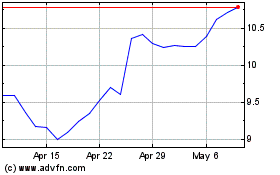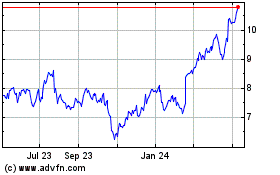Judge Rules for J.P. Morgan in $8.6 Billion Lehman Lawsuit
October 01 2015 - 3:00PM
Dow Jones News
A federal judge in New York granted a victory to J.P. Morgan
& Co. in its $8.6 billion legal fight with Lehman Brothers
Holdings Inc.'s, rejecting the failed investment bank's claim that
J.P. Morgan illegally siphoned billions of dollars from Lehman
before the bank's collapse.
Judge Richard Sullivan of the U.S. District Court in New York
said J.P. Morgan didn't abuse its leverage as Lehman's primary
clearing bank to force the investment bank to hand over more
collateral in the weeks before its historic September 2008
collapse.
In a 31-page decision made available Thursday, Judge Sullivan
said he rejected Lehman's "fundamental premise" that J.P. Morgan
"was obligated to extend credit to Lehman under its credit
agreement."
While the judge granted the bulk of J.P. Morgan's summary
judgment motion to dismiss Lehman's claims, he said the investment
bank could pursue its bid to subordinate J.P. Morgan's claim to
those of other creditors.
A J.P. Morgan spokesman said the bank was pleased with the
ruling. A spokeswoman for Lehman's postbankruptcy estate declined
to comment.
Lehman initially sued J.P. Morgan in May 2010, alleging that
J.P. Morgan dollars engaged in a "voracious" cash grab to create an
$8.6 billion "slush fund" in the investment bank's final days.
As Lehman's clearing bank, J.P. Morgan provided cash advances of
up to $100 billion a day to Lehman to facilitate overnight
repurchase, or repo, agreements. That role resulted in J.P. Morgan
being one of Lehman's main adversaries in numerous disputes
surrounding the investment bank's demise as well as one of its
largest creditors.
J.P. Morgan later countersued, saying it extended to Lehman
hundreds of billions of dollars in credit that actually benefited
Lehman's creditors by avoiding a fire sale of the bank's assets in
the days following Lehman's failure.
Like other Wall Street broker-dealers, Lehman depended on the
tri-party repo market to fund its business. In a typical tri-party
repo, a bank like J.P. Morgan acts as the middleman between
money-market funds lending cash and a broker-dealer like
Lehman.
In the turbulent days after Lehman filed for bankruptcy, it sold
its broker-dealer business to Barclays PLC. When the dust settled,
J.P. Morgan said some $25 billion it had advanced to Lehman's
broker-dealer was left unpaid and it was stuck with the illiquid
securities that Barclays didn't want. To close the hole, J.P.
Morgan applied $8.6 billion of collateral that Lehman's holding
company had pledged to the bank the days before its collapse.
Lehman, once the nation's fourth-largest investment bank,
collapsed into the largest bankruptcy ever in September 2008. The
filing sent markets into turmoil and helped trigger a global
financial crisis. Lehman's brokerage business was quickly sold to
Barclays.
The fight with J.P. Morgan is one of a few large remaining
orders of business for Lehman, which officially emerged from
Chapter 11 protection in March 2012. However, because it has
billions of dollars in remaining assets and more money to pay back
creditors, as well as ongoing litigation with J.P. Morgan and
others, the bank is expected to exist in some form for years to
come.
Write to Patrick Fitzgerald at patrick.fitzgerald@wsj.com
Access Investor Kit for "Barclays Plc"
Visit
http://www.companyspotlight.com/partner?cp_code=P479&isin=GB0031348658
Access Investor Kit for "Barclays Plc"
Visit
http://www.companyspotlight.com/partner?cp_code=P479&isin=US06738E2046
Subscribe to WSJ: http://online.wsj.com?mod=djnwires
(END) Dow Jones Newswires
October 01, 2015 14:45 ET (18:45 GMT)
Copyright (c) 2015 Dow Jones & Company, Inc.
Barclays (NYSE:BCS)
Historical Stock Chart
From Mar 2024 to Apr 2024

Barclays (NYSE:BCS)
Historical Stock Chart
From Apr 2023 to Apr 2024
